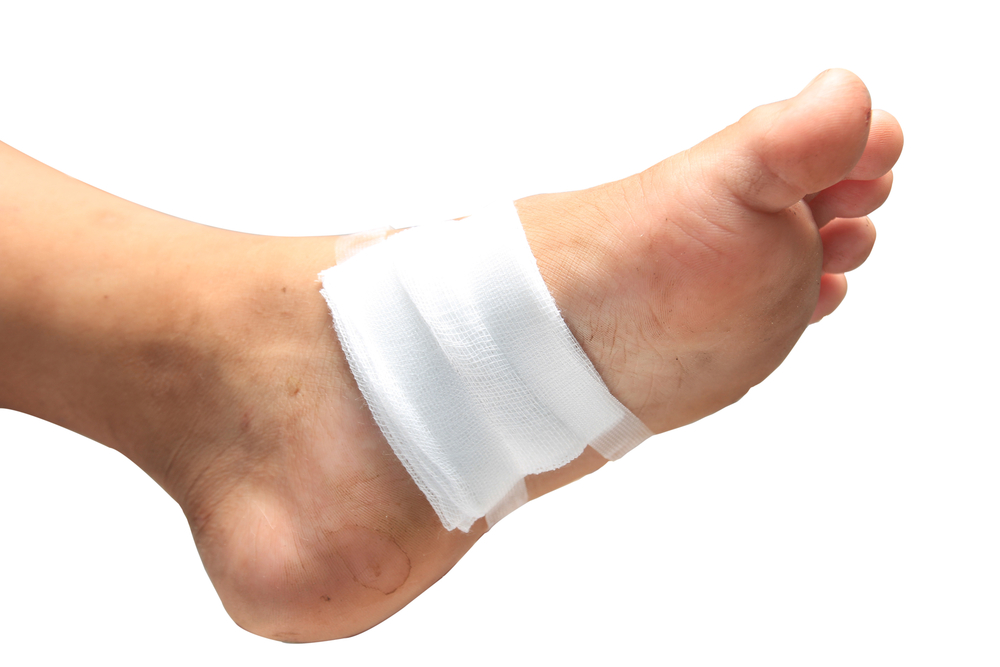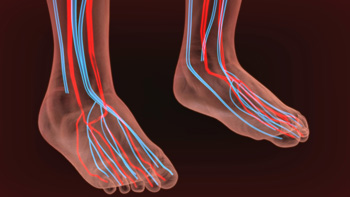 Our feet endure pressure during the majority of the day. It is important to promptly treat existing cuts or bruises on the feet, as this may be helpful in preventing foot wounds from developing. Patients who may be susceptible to developing wounds on the feet can include people who are diabetic or have medical conditions consisting of elevated cholesterol and blood pressure. It is beneficial to wear shoes and socks that are comfortable, in addition to trimming the toenails properly. A wound on the foot will heal faster when treated quickly, and it is strongly advised that you speak with a podiatrist who can effectively treat foot wounds.
Our feet endure pressure during the majority of the day. It is important to promptly treat existing cuts or bruises on the feet, as this may be helpful in preventing foot wounds from developing. Patients who may be susceptible to developing wounds on the feet can include people who are diabetic or have medical conditions consisting of elevated cholesterol and blood pressure. It is beneficial to wear shoes and socks that are comfortable, in addition to trimming the toenails properly. A wound on the foot will heal faster when treated quickly, and it is strongly advised that you speak with a podiatrist who can effectively treat foot wounds.
Wound care is an important part in dealing with diabetes. If you have diabetes and a foot wound or would like more information about wound care for diabetics, consult with one of our podiatrists from PA Foot & Ankle Associates. Our doctors will assess your condition and provide you with quality foot and ankle treatment.
What Is Wound Care?
Wound care is the practice of taking proper care of a wound. This can range from the smallest to the largest of wounds. While everyone can benefit from proper wound care, it is much more important for diabetics. Diabetics often suffer from poor blood circulation which causes wounds to heal much slower than they would in a non-diabetic.
What Is the Importance of Wound Care?
While it may not seem apparent with small ulcers on the foot, for diabetics, any size ulcer can become infected. Diabetics often also suffer from neuropathy, or nerve loss. This means they might not even feel when they have an ulcer on their foot. If the wound becomes severely infected, amputation may be necessary. Therefore, it is of the upmost importance to properly care for any and all foot wounds.
How to Care for Wounds
The best way to care for foot wounds is to prevent them. For diabetics, this means daily inspections of the feet for any signs of abnormalities or ulcers. It is also recommended to see a podiatrist several times a year for a foot inspection. If you do have an ulcer, run the wound under water to clear dirt from the wound; then apply antibiotic ointment to the wound and cover with a bandage. Bandages should be changed daily and keeping pressure off the wound is smart. It is advised to see a podiatrist, who can keep an eye on it.
If you have any questions, please feel free to contact one of our offices located in Allentown, Easton, Northampton, and Chew Street in Allentown, PA . We offer the newest diagnostic and treatment technologies for all your foot care needs.
 The symptoms that can occur with poor circulation often include a numbing sensation in the limbs, and the feet can tingle and feel cold. The causes of poor circulation may be medical conditions consisting of diabetes, peripheral artery disease (PAD), and obesity. Some of the symptoms that are associated with this ailment can be shortness of breath, chest pain, and many patients can feel tired for the majority of the day. It may be beneficial to begin a vitamin regime, in addition to incorporating gentle exercise and stretching techniques into your daily routine. If you are experiencing any symptoms of poor circulation, it is suggested that you consult with a podiatrist who can guide you toward proper treatment options.
The symptoms that can occur with poor circulation often include a numbing sensation in the limbs, and the feet can tingle and feel cold. The causes of poor circulation may be medical conditions consisting of diabetes, peripheral artery disease (PAD), and obesity. Some of the symptoms that are associated with this ailment can be shortness of breath, chest pain, and many patients can feel tired for the majority of the day. It may be beneficial to begin a vitamin regime, in addition to incorporating gentle exercise and stretching techniques into your daily routine. If you are experiencing any symptoms of poor circulation, it is suggested that you consult with a podiatrist who can guide you toward proper treatment options.
Poor circulation is a serious condition and needs immediate medical attention. If you have any concerns with poor circulation in your feet contact one of our podiatrists of PA Foot & Ankle Associates. Our doctors will treat your foot and ankle needs.
Poor Circulation in the Feet
Poor blood circulation in the feet and legs is can be caused by peripheral artery disease (PAD), which is the result of a buildup of plaque in the arteries.
Plaque buildup or atherosclerosis results from excess calcium and cholesterol in the bloodstream. This can restrict the amount of blood which can flow through the arteries. Poor blood circulation in the feet and legs are sometimes caused by inflammation in the blood vessels, known as vasculitis.
Causes
Lack of oxygen and oxygen from poor blood circulation restricts muscle growth and development. It can also cause:
- Muscle pain, stiffness, or weakness
- Numbness or cramping in the legs
- Skin discoloration
- Slower nail & hair growth
- Erectile dysfunction
Those who have diabetes or smoke are at greatest risk for poor circulation, as are those who are over 50. If you have poor circulation in the feet and legs it may be caused by PAD and is important to make changes to your lifestyle in order to reduce risk of getting a heart attack or stroke. Exercise and maintaining a healthy lifestyle will dramatically improve conditions.
As always, see a podiatrist as he or she will assist in finding a regimen that suits you. A podiatrist can also prescribe you any needed medication.
If you have any questions please feel free to contact one of our offices located in Allentown, Easton, Northampton, and Chew Street in Allentown, PA . We offer the newest diagnostic and treatment technologies for all your foot and ankle needs.


